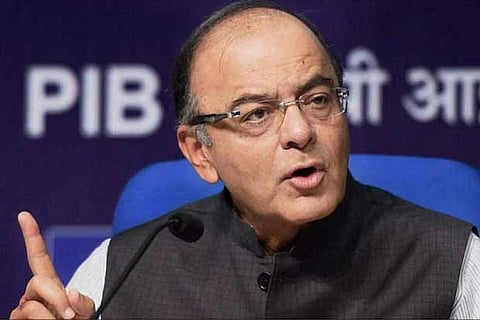

New Delhi
Asserting that a single rate Goods and Services Tax (GST) is not possible in the country, Finance Minister Arun Jaitley said on Thursday it is only applicable in a nation where the purchasing power of the people is uniform.
"It is possible only in an economy where there is similarly placed population to have a single rate to start off with. In a highly differentiated society like India, it is not possible. Therefore we started with differential rates," Jaitley said here at the HT Leadership Summit.
"We had an atrocious tax system pre-July 1. These brackets would not have been possible if everyone were not on the same page. Let me make it clear, though, a single rate GST is not possible in India. We cannot have a tax system which has the same rate for a Hawai chappal and Mercedes car," Jaitley asserted.
The finance minister said the country will need a "boom period" like during 2003 to 2008 in order to achieve 10 per cent growth, which is a "challenging figure".
"A 10 per cent growth is a very challenging figure and a 10 per cent growth will not depend merely on domestic factors. It will also depend on how the world is moving," said Jaitley.
"We managed for three years, a 7-8 per cent growth rate at the time when the world was moving slowly. And I think we effectively used that period, while we were growing between 7 and 8 per cent and the world was slow, in order to bring a series of structural changes in the economy. Certainly, it will help us in the medium and long term to expedite the growth itself.
"I'm realistic that to reach a double-digit growth we need to have a boom period that we had between 2003 and 2008. If the world is only on recovery mode, as the world today is, for an economy to generate that kind of demand on its own is going to be extremely difficult," he asserted.
Talking about the banking sector, Jaitley pointed out that over the last three years, the growth would have been a little higher if the banks -- which were full of non-performing assets (NPA) -- were robust enough to support the growth.
"I think one of the biggest challenges over the last three years has been that we inherited a banking system which was full of NPAs. Our solution also is a little delayed solution and the ability of banks to support growth was restricted," the minister said.
"I'm quite certain that even in the slowdown period, when we grew between 7-8 per cent - 8 per cent in one year and 7.6 in another year - we could have notched a little higher had the banks been more robust in being able to support the growth," Jaitley maintained.
Talking about the recently rolled-out GST rates, Jaitley said if GST rates were initially fixed at lower levels, it would have had an inflationary impact on the economy.
"I don't think the teething problems (in implementation of GST) had anything to do with the rates because initially if we would have come with the lower rates GST would have had an inflationary impact," said Jaitley.
"Earlier, there used be an effective tax rate of 31 per cent, we temporarily parked them at 28 per cent. On most of the items we have brought it down to 18 per cent and 12 per cent now."
Hinting at merger of 12 per cent and 18 per cent rates, Jaitley said rationalisation of taxes have started ahead of schedule and future rationalisation will depend on revenue collection.
"Future rationalisation will depend on how the collections go on. The collections have to improve. We have to maintain a revenue neutrality," said Jaitley.
"We have already thinned out the 28 per cent bracket, it can thin down more. As far as your collections are going up, the next stage would be - Do you have a scope then for merging the 12 and 18 per cent tax brackets?" he asked.
Talking about employment, the Finance Minister said since most of employment in the country is generated by the small and medium enterprises (SMEs), informal and the unorganised sector, one of the major areas where the government will concentrate is on SME as well as the informal sector.
Talking about the government's plan for the Union Budget 2018-19, which will be its last before the 2019 elections, the Finance Minister said there will two focus areas -- infratsructure and rural India.
Visit news.dtnext.in to explore our interactive epaper!
Download the DT Next app for more exciting features!
Click here for iOS
Click here for Android